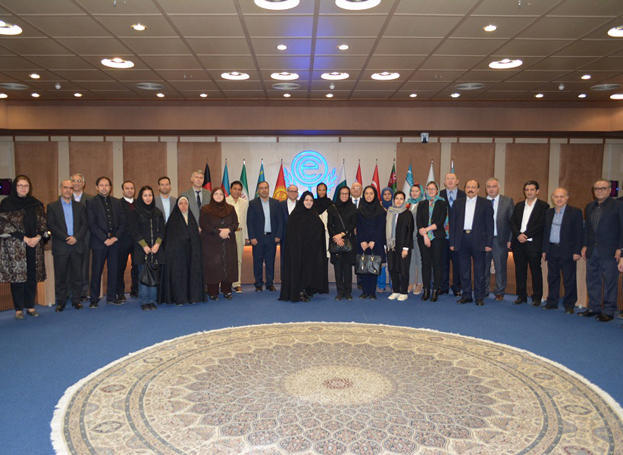UNESCO and ECO co-organize Regional Workshop on Promoting School Safety

“Overall, annual economic losses from disasters represent between USD 250 billion and USD 300 billion, according to UNISDR. Studies of disaster trends and the likely consequences of climate change suggest that each year 175 million children will be affected by natural hazard-related disasters alone” – Ms. Kuisch Laroche, Director of the UNESCO Tehran Cluster Office, AVA Diplomatic reports.
UNESCO and the Economic Cooperation Organization (ECO) Secretariat have partnered together to organize a regional workshop promoting safety at the school level. The workshop runs for three days in Tehran from 22 to 24 October 2017.
ECO is an intergovernmental regional organization composed of ten Member States from Europe, Caucasia, Central Asia, Middle East, and South Asia. The overall objective of the Organization is the sustainable economic development of its Member States and the ECO region as a whole.
The workshop brings together representatives from ECO Member States Azerbaijan, Iran, Kazakhstan, Kyrgyz Republic, and Pakistan. Representing ministries of education and national disaster management agencies, these national experts were invited to deliver presentations on the current state of school safety and disaster risk reduction (DRR) education in their respective countries.
Various Iranian education and DRR experts are also participating in the workshop, representing the National Disaster Management Organization, the Ministry of Education, the International Institute of Earthquake Engineering and Seismology, the UNESCO Chair on National Disaster Management, the Iranian National Commission for UNESCO, as well as UN agencies UNICEF and UN-Habitat.
In order to support different countries in the development and implementation of concrete action plans for safer schools, UNESCO, together with other major UN agencies and non-governmental organizations committed to disaster risk reduction, joined the Global Alliance for Disaster Risk Reduction and Resilience in the Education Sector or GADRRRES.
The Alliance, which UNESCO co-chairs while also hosting the Secretariat, promotes a comprehensive approach to DRR education based on three overlapping areas of focus: Safe School Facilities, School Disaster Management, and Risk Reduction and Resilience Education.GADRRRES promotes a comprehensive approach to DRR education through the Comprehensive School Safety Framework. This approach is based on education policy, plans, and programmes that are aligned with disaster management at national, regional, district and local school site levels.
Moreover, UNISDR has coordinated the development of a Worldwide Initiative for Safe Schools or WISS. The Initiative focuses on motivating and supporting Governments to develop national strategies and implement school safety. It was launched in the framework of the Sendai Conference in 2015 and has resulted in the political commitment of 21 “Safe School Leader” countries – including a number of ECO Member States – to implement school safety on the ground.
The regional workshop builds on the outcomes of the Second Safe School Leaders Meeting which also took place in Tehran in October 2015.
In her remarks, UNESCO Director and Representative Ms. Esther Kuisch Laroche stressed that “without safe schools, learning and teaching will be disrupted in the aftermath of a disaster, often causing children to roam around in the streets where they may be more exposed to abuse, exploitation and separation from their families in the chaotic post-disaster situation. Or causing them to lose an entire school year, as they cannot catch up on the weeks or months spent out of school”.
Dr. Seyed Jalaledin Alavi Sabzevari, Deputy Secretary General of ECO, briefed participants on ECO post-Sendai activities in the field of DRR and school safety, focusing in particular on the ECO Regional Framework on DRR. The framework was recently finalized in in Ankara, Turkey. Mr. Alavi expressed hope that the lessons learnt from the workshop would help the ECO Secretariat in the implementation of the of the ECO DRR Regional Framework.
Dr. Ali Shahri, Deputy Head of the Organization for the Development, Renovation and Equipping of Schools, Iranian Ministry of Education, likewise highlighted the importance of safe schools “as students are the most important human resources for building a sustainable future for the country. In this regard, in 2005, Iran’s Parliament allocated four million dollars to retrofit and renovate 9,500 schools. An additional three million dollars was allocated in 2016 for school renovation projects to be implemented from 2017 to 2022. Moreover, charity organizations and the private sector contributed over 400 million dollars in 2014 alone for the retrofitting of schools in Iran.”
Mr. Siamak Moghaddam, Representative and Chief of UN-Habitat Tehran, underscored that “schools do not only serve students during the earthquakes or other disasters, but they can also act as a temporary shelter for communities. Although building codes and regulations are sufficiently being met in many countries, implementation might have overshadowed the importance of the quality aspects in the midst of a huge rush toward quantity. According to “New Urban Agenda”, which sets a new global standard for sustainable urban development, DRR and resilient cities can be achievable.“
Aside from experience sharing among the ECO Member States, the workshop will feature practical training sessions led by DRR experts from ECO and UNESCO, Mr. Mahmudul Islam and Ms. Margherita Fanchiotti. The training sessions will focus on topics such as the integration of DRR in public education sector planning, and disaster resilient citizenry through education and capacity building. Ms Fanchiotti, from UNESCO headquarters in Paris, will also provide training on the UNESCO Visual Inspection for Defining the Safety Upgrading Strategies or VISUS, which is a safety assessment methodology that facilitates the decision-making process in the definition of upgrading strategies.
Day 3 of the workshop will involve visits to retrofitted schools, as well as a tour of the premises of the International Institute of Earthquake Engineering and Seismology.

